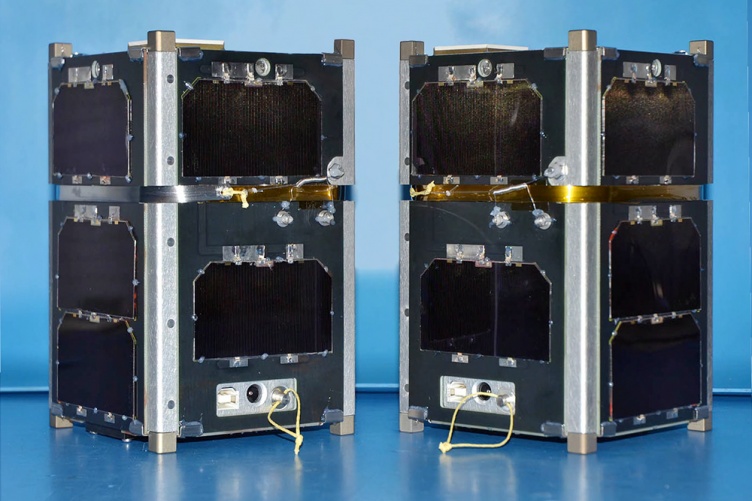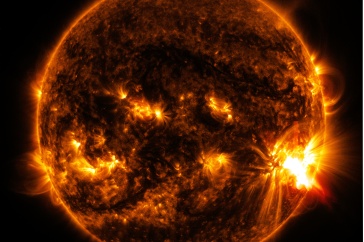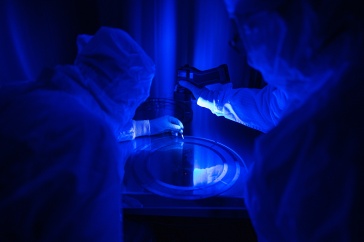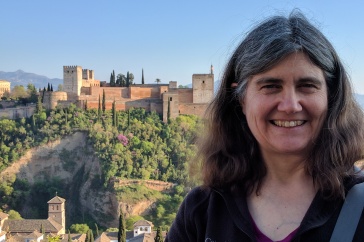
Small satellites like these, called CubeSats, will be designed and built by UNH students as part of a new NASA mission to monitor the solar wind in Earth's upper atmosphere.
Scientists from the UNH Space Science Center are gearing up to offer students a new hands-on research experience that’s out of this world.
The Student Collaboration Project, led by UNH research associate professor of physics Noé Lugaz, aims to augment the solar wind data collected by NASA’s Interstellar Mapping and Acceleration Probe (IMAP) mission, provide hands-on research experience for undergraduate and graduate students, and help to diversify the field of space science. UNH will receive approximately $4.6 million from NASA for its part in the project.
In the coming months, Lugaz and other project collaborators will begin recruiting the first cohort of students from three universities: UNH, Howard University in Washington D.C., and Sonoma State University in Rohnert Park, California. During this five-year project, students from each university will design and build a CubeSat — essentially a small satellite the size of a half-gallon of milk — with an instrument that will quantify the concentration of oxygen in the Earth’s upper atmosphere to provide scientists with clues about how the solar wind affects the upper part of the atmosphere. This is the region where many satellites orbit and knowing precisely the atmosphere density helps determine their orbit and lifetime.
“When large solar storms occur, they can result in a chain reaction of particles released in the upper atmosphere,” Lugaz explains. “As a result, we expect to see a change in the density of oxygen in that region.”
The CubeSats will launch in 2024 separately from the main IMAP mission but concurrently in order to collect complementary data. The CubeSats will be in space for about four months and will be located much closer to the Earth than the other IMAP instruments.
Lugaz says that UNH is poised to lead such a program in part because of its strong space physics program and its history of students developing payloads for numerous rocket science missions. “The students from each university have a variety of strengths and experiences that will allow them all to learn from one another,” he says. “They’re not just doing this on their own, they’ll be collaborating and interacting with each other via online learning tools and technology so they can talk to one another and learn together.”
Other faculty and scientific staff from the UNH Space Science Center, including professor of physics Marc Lessard and research engineer Jason Legere, will provide mentoring support for the UNH students who are selected for the project. Sonya Smith, a UNH project manager on various space missions, will provide logistical project support for the UNH team.
For Lugaz and his collaborators, achieving the project’s diversity objective is even more important than the science objective.
“We’re missing out on so much potential with great people out there,” Lugaz says. “Much of science is publicly funded and we want everyone in the U.S. who is qualified to get involved — even if it’s just for one year, and then they move on to something else. We can really start to make a difference.”
Lugaz hopes that at least some of the students who get involved in this project will go on to graduate school and ultimately help to shape a new, more equitable space physics field. The project is interdisciplinary, so recruitment is open to undergraduate students in various majors, not just physics, he adds. UNH students who are interested in participating in this project should contact Lugaz at noe.lugaz@unh.edu or Marc Lessard at marc.lessard@unh.edu.
The Institute for the Study of Earth, Oceans, and Space (EOS) is UNH’s largest research enterprise, comprising six centers with a focus on interdisciplinary, high-impact research on Earth and climate systems, space science, the marine environment, seafloor mapping, and environmental acoustics. With more than $43 million in external funding secured annually, EOS fosters an intellectual and scientific environment that advances visionary scholarship and leadership in world-class research and graduate education.
-
Written By:
Rebecca Irelan | Institute for the Study of Earth, Oceans, and Space | rebecca.irelan@unh.edu | 603-862-0990



















































